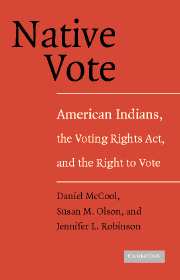Preface
Published online by Cambridge University Press: 05 June 2012
Summary
When the Founding Fathers designed our government at the Constitutional Convention, their concept of “democracy” was quite different from what that term means to most people today. They held the view that the “consent of the governed” came from only a small fraction of the populace – propertied white males. Article I, Section 4, of the U.S. Constitution gave states the power to prescribe rules for the “times, places, and manner of holding elections,” but it also gave Congress the right to “make or alter such regulations.” This split control over election laws led to dramatic conflicts between the states and the federal government regarding who is entitled to vote. Eventually this conflict led to the Fifteenth Amendment to the Constitution and ultimately to the Voting Rights Act of 1965 (VRA) and its amendments. This book examines the impact that landmark legislation has had on the voting rights of American Indians.
The right to vote is the foundation of democratic government; all other policies are derived from it. Yet there is an “astounding lack of research” on Indian politics, especially Indian voting (Wilkins 2002, 188). Many textbooks on Indian law and Indian policy hardly mention it, and when Indian voting is discussed, the focus is almost always on tribal elections. There is virtually no coverage of the role of Indian voting in federal, state, and local elections. Voting studies usually ignore Indians, and national data sets often lump Indians into an “other” category.
- Type
- Chapter
- Information
- Native VoteAmerican Indians, the Voting Rights Act, and the Right to Vote, pp. ix - xivPublisher: Cambridge University PressPrint publication year: 2007



